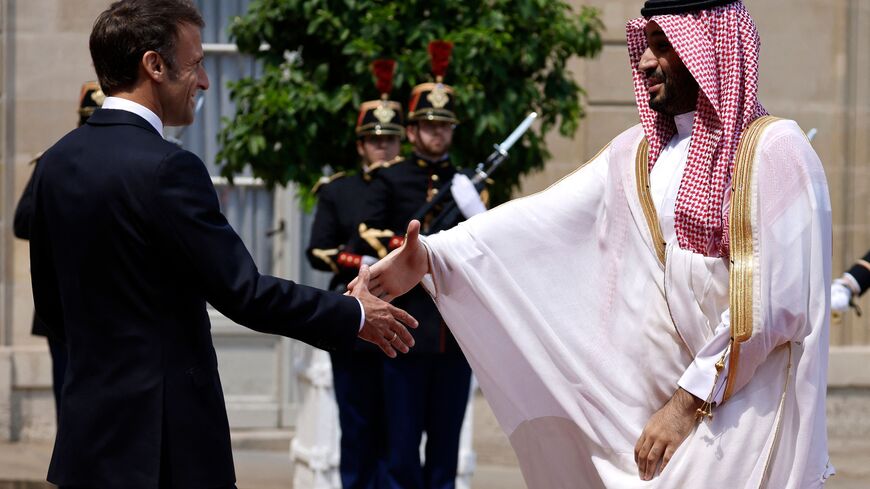The last week has been significant for both Saudi Arabia and France, as French President Emmanuel Macron hosted Saudi Arabia's Crown Prince Mohammed bin Salman (MBS) for talks on investment opportunities in areas including culture, tourism, technology and clean energy.
Arriving last week and holding talks with Macron on Friday, it was the crown prince's second visit to France in the last year. Ties between the two countries are strong, and unlike many other European leaders, who have taken a step back from MBS over the kingdom's human rights record, Macron has been warmer to him, hosting the royal on an official visit to France last July. At the time, human rights campaigners criticized Macron's decision, as it was only four years after the killing of Saudi journalist Jamal Khashoggi at the Saudi Consulate in Istanbul.
The kingdom’s Investment Minister Khalid Al-Falih led the delegation at the French-Saudi Investment Forum in Paris on Monday, which was hosted by Falih’s ministry. Paris is also hosting a conference on Thursday and Friday called the Summit for a New Global Financial Pact that MBS is attending, which will touch on issues including climate change, energy and economic crises.
On Tuesday, MBS attended a ceremony held at the Bureau International des Expositions, the organizing body for International Expo exhibitions, to showcase Riyadh’s pitch to host the event in 2030. If Riyadh ends up hosting the event, it will pump billions of dollars into the Saudi economy.
"The French president expressed support for the bid [rather than those from Italy and South Korea], again illustrating a willingness to withstand the criticism aroused by the relationship," Pat Thaker, editorial and regional director, MEA at The Economist Intelligence Unit, told Al-Monitor.
Thaker said that the "unusual length" of MBS's trip reflected the wide-ranging geopolitical and economic objectives.
Last Friday, MBS held a bilateral meeting with Macron to discuss the relationship between Paris and Riyadh as well as the war in Ukraine and its consequences for the rest of the world. The two men also discussed the political vacuum in Lebanon.
Falih said at the French-Saudi Investment Forum on Monday that France would play a key role in the kingdom’s Vision 2030 plan to wean the economy off of oil and develop public service sectors such as health, education, infrastructure, recreation and tourism.
“My records show we have more than 110 French companies in Saudi Arabia,” the minister said. “We have 360 licenses that have been granted to wholly-owned French companies or joint ventures from France that are operating in the kingdom, with their presence expanding 43% since 2020.”
He added that trade between the two countries came to $12 billion in 2022, a growth of 47% compared with 2021.
French Trade Minister Olivier Becht added that Saudi Arabia was the leading destination for France’s foreign direct investment (FDI) in the region. France’s total FDI in Saudi Arabia amounts to nearly $6 billion.
The forum culminated in the signing of 24 memorandums of understanding between Paris and Riyadh, with a total value of around $2.9 billion.
Among them included a memorandum between French firm Spie Group to explore investment opportunities in energy and promote major operations maintenance. The Saudi Investment Ministry also signed agreements with French companies Vallourec to manufacture fabrications for the energy industry and Veolia to work together in the kingdom’s waste management programs.
The conference comes off the back of French disappointment that Saudi Arabia’s new airline, Riyadh Air — which is owned by the kingdom’s influential Public Investment Fund — chose earlier this year to order US-made Boeing jets instead of aircraft from France-headquartered Airbus at the Paris Air Show this week. The new carrier announced a provisional order of up to 72 Boeing 787 Dreamliners in March, and there was a rumor that there would be an Airbus order in Paris. Riyadh Air CEO Tony Douglas said on Sunday that his airline would not be ordering any more aircraft at the air show in Le Bourget this year.
However, there was a constellation in the aviation and defense sector for Paris. On the sidelines of the French-Saudi Investment Forum, Saudi defense company SCOPA Industries signed an agreement with Airbus to jointly produce civil and military helicopters in the Gulf country, SCOPA CEO Fawaz Alakeel told Saudi state TV on Monday. Alakeel said SCOPA expects to manufacture more than 100 helicopters and create 8,500 jobs in the kingdom.
"Saudi Arabia and France have long had major defense ties, as among the world’s largest arms importers and exporters respectively," Thaker said.
Furthermore, Saudi Arabia's budget carrier Flynas firmed up an order for 30 more Airbus A320neo family aircraft worth 14 billion Saudi riyals ($3.73 billion) at the air show on Tuesday. But it falls short of the larger order Airbus hoped for from Riyadh Air, as list prices are usually much more than the actual deal value.
Jonathan Panikoff, director of the Scowcroft Middle East Security Initiative at the Atlantic Council's Middle East Program, told Al-Monitor that for Saudi Arabia, the trip provides another opportunity to consider investing in various French firms.
He said that Paris and Riyadh both see MBS's visit and the conferences surrounding it as an opportunity to increase trade between the two countries, in line with Vision 2030 goals to significantly increase FDI. But the Expo bid is also high on MBS’s priority list.
“While Saudi Arabia’s political influence is growing regionally, it has not fully matured globally,” Panikoff said. “But that’s a lagging indicator. Its business influence is clearly growing across sectors as it looks to diversify its economy from hydrocarbons and more countries welcome Saudi investment across sectors."
He added, “The Paris Summit reflects Macron’s desire to demonstrate his and France’s climate change leadership, and Saudi Arabia has a meaningful role to play as one of the world’s largest oil producers."
Saudi Arabia can also play a role in financing green energy projects in France too. Jonathan Walters, a former World Bank economist based in the Middle East, told Al-Monitor, “Western countries clearly face challenges in adequately financing clean energies in developing countries, and Gulf countries such as Saudi Arabia and the UAE could play an extremely constructive role in providing such financing to developing countries in support of climate change mitigation objectives."
He added, "Saudi Arabia supporting President Macron’s initiative to provide leadership on climate financing would be very beneficial in that regard."
Thaker said that Saudi Arabia stepping up cooperation with France is consistent with the kingdom's wider foreign policy of diversifying alliances while demonstrating to the US that it has alternative strategic Western partners.
MBS's visit to France has been rebuked by human rights groups. Despite Riyadh’s growing status in international business, Panikoff said that is no reason to believe that European criticism of Saudi Arabia’s human rights record will stop, but it is reasonable to question how much impact will be attached to them.
“There’s a bit of conflict associated with European priorities,” he said. “To meaningfully tackle global climate change there’s no choice but to engage and actively work with various autocratic regimes, including in the Middle East and, of course, China."
Panikoff added, “But that work is going to be largely at odds with the agenda of human rights organizations and campaigns, and it’s not clear these priorities can be meaningfully reconciled."








